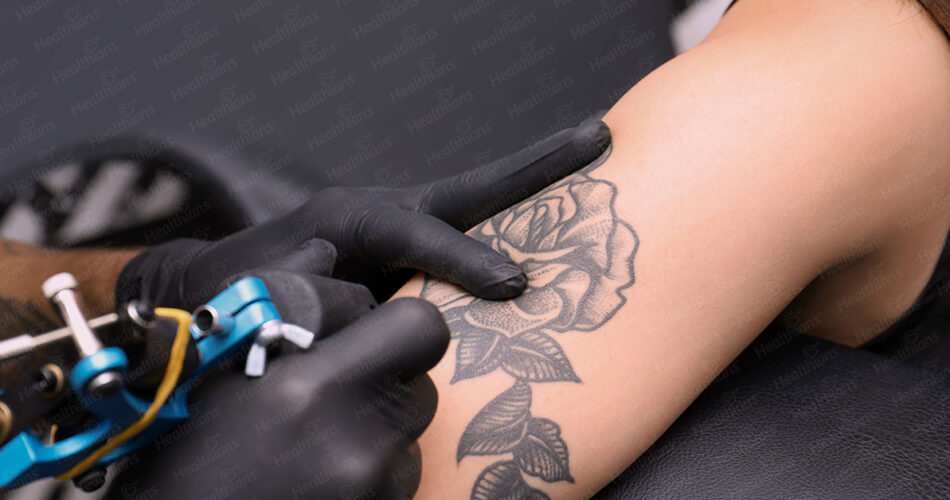The use of tattoos for body modification has been around for thousands of years. Tattoos have traditionally been used to indicate social status, mark a rite of passage, or express religious or cultural beliefs. In modern times, their popularity has been growing, especially among young adults. It has become a popular form of self-expression and a way to show one’s individuality.
However, they are not without consequential health risks. Most people are unaware of their consequences, so it’s critical to carefully weigh the risks and benefits before getting inked. Here are some of the most common health problems associated with tattoos:
Risks associated with tattoos
Infection
While getting a tattoo, the needle punctures your skin, which might allow bacteria to enter your body. You could get an infection if the tattoo artist does not take the necessary procedures to disinfect their tools or if you do not properly care for your tattoo after obtaining one. Symptoms of an infected tattoo may include redness, swelling, pus, and fever. In severe cases, an infected tattoo can lead to sepsis, a life-threatening condition.
Allergic reactions
Some individuals may have an allergic reaction to the tattoo’s ink or needle. This may necessitate medical care because it can result in redness, swelling, and even blistering.
Possibility of scarring
Scarring can occur if your skin does not heal properly after getting a tattoo. If you have a history of keloids, or if the tattoo artist uses too much ink or goes too deep into your skin, this is more likely to happen.
Skin diseases
Although uncommon, some people may develop skin diseases such as psoriasis or eczema at the site of their tattoo, such as psoriasis or eczema. This could be because the tattoo ink triggered an immune response.
Blood-borne illnesses
You run the danger of transmission of blood-borne illnesses like HIV or hepatitis B or C if the tattoo artist uses contaminated tools or if you share needles while getting tattooed.
Magnetic resonance imaging (MRI) issues
Studies show that certain tattoo inks include metallic particles that could react with magnetic resonance imaging studies. This can result in incorrect findings or even burns.
Sunburn
This is more likely to occur if you have tattoos because they might make your skin more sensitive to sunlight.
In addition to these health issues, tattoos can also have social and professional repercussions because some individuals and places of employment may not accept them. If you work for the hospitality industry, for example, a visible tattoo may be seen as unprofessional and could even impact your job prospects. It’s important to consider how a tattoo may affect your career goals before getting inked.
Think twice before you decide
It’s crucial to carefully weigh the advantages and disadvantages of getting a tattoo while you are deciding. To reduce the possibility of difficulties, if you do decide to get a tattoo, make sure to select a recognised and skilled tattoo artist and strictly adhere to their aftercare guidelines.
Also, since tattoos are permanent, you should give great thought to their layout and placement before obtaining one. Your tastes and preferences may change over time, even though getting a tattoo may seem like a smart decision at the moment. The process of having a tattoo removed can be painful, costly, and time-consuming if you decide that you no longer like it.
Last but not least, it’s critical to select a respectable and knowledgeable tattoo artist. While it could seem like a smart idea to save money by getting a tattoo from a friend or an amateur, it can also be risky. A qualified tattoo artist will have the education and expertise required to ensure that your tattoo is made accurately and securely. In order to assist you avoid infection and ensure that your tattoo heals properly, they will also be able to give you aftercare recommendations.
Final Thoughts
In conclusion, getting a tattoo is a personal choice that needs to be carefully thought out. Although getting inked can be a wonderful way to express yourself, there are some concerns that you should be aware of. Pain, allergic reactions, infections, social and professional repercussions, and tattoo permanence are some of these hazards. Prior to having a tattoo, it’s crucial to pick a respected artist and give serious thought to the style and placement. If you do choose to get a tattoo, make sure to strictly adhere to your artist’s aftercare recommendations to guarantee a good healing process and prevent any potential issues.




